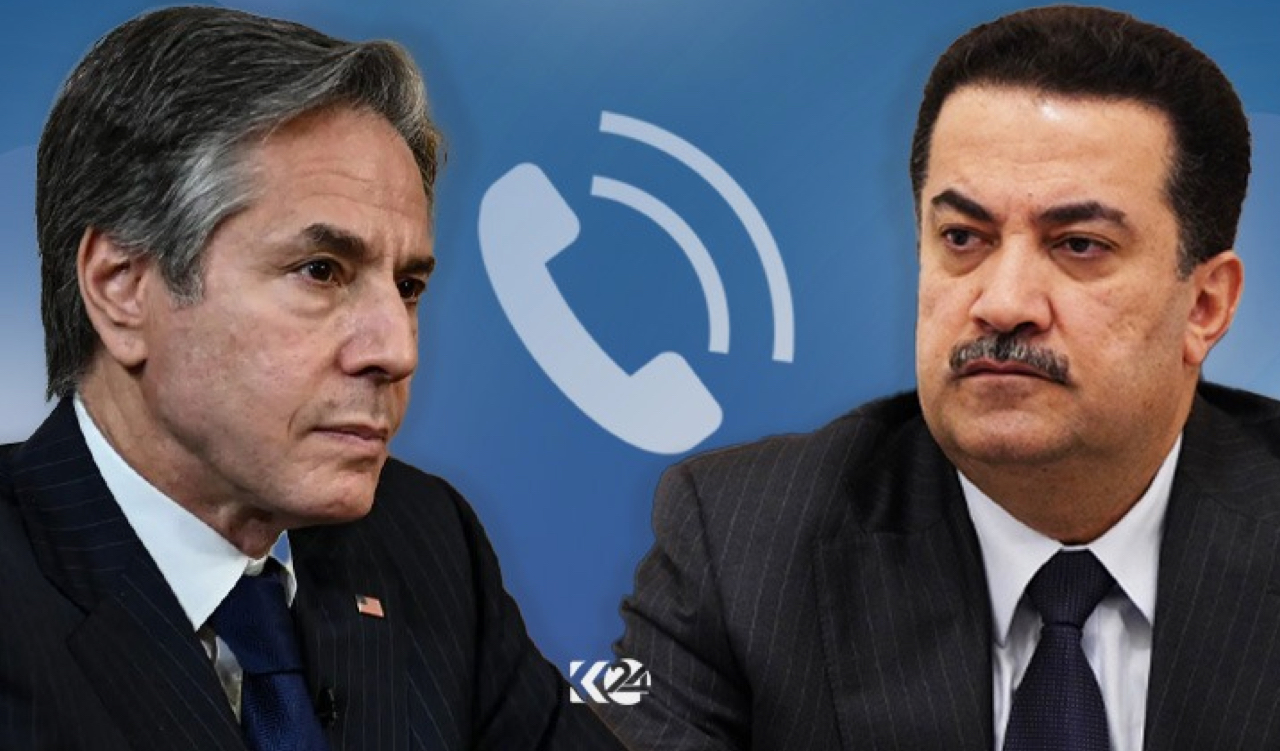US Secretary of State Speaks with Iraqi Prime Minister

WASHINGTON DC, United States (Kurdistan 24) – U.S. Secretary of State Antony Blinken spoke with Iraqi Prime Minister Mohammed Shi’a al-Sudani on Friday.
The two senior figures discussed three issues, according to a summary provided by State Department Spokesperson Matthew Miller.
The first issue was the U.S. military presence in Iraq. Blinken “called on the Iraqi government to protect all installations hosting U.S. personnel,” stressing that the troops were in Iraq at the invitation of the Baghdad government.
Blinken also called on Sudani “to pursue those responsible for attacks on U.S. personnel in Iraq.”
Did the Nov. 22 U.S. Retaliatory Strikes Actually Work?
Since Oct. 17, there have been 74 attacks carried out by pro-Iranian militias against facilities hosting U.S. forces in Iraq and Syria, as the Pentagon’s Deputy Spokesperson Sabrina Singh told journalists on Thursday.
The last such strike occurred on Tuesday, Nov. 28, she said. That represented a pause of five days, as there had been no such attacks since Nov. 23.
The recent truce between Israel and Hamas in Gaza also began on Nov. 23. So U.S. officials attributed the pause in attacks on U.S. troops in Iraq and Syria to the truce in Gaza, although the reason for such a connection was not readily evident.
Those drawing such a link include Pentagon Press Secretary, Brig. Gen, Pat Ryder, who suggested just such a connection to journalists in his briefing on Nov. 28.
Read More: No attacks on US troops since Israel-Hamas truce began: Pentagon
But did they mistake coincidence for causality? An equally plausible explanation, if not more so, for the pause in attacks on U.S. forces was the retaliatory strike the U.S. launched the day before—on Nov. 22.
For the first time, the U.S. moved beyond “tit for tat,” responding with a carefully calibrated response that matched the attack that had been launched against U.S. troops.
On Nov. 22, the U.S. also responded to strikes that targeted U.S. forces in Iraq with a strike in Iraq! And it was not just one strike—but two, both of which targeted sites belonging to the pro-Iranian militia, Kata’ib Hizbollah, which the U.S. had designated as a terrorist group already in 2009.
Indeed, one of the two targeted Kata’ib Hizbollah sites—Jurf al-Saqr—lies south of Baghdad, very far from the base that it had attacked.
Read More: U.S. responds to ‘close-range ballistic missile’ attack with strikes in Iraq
Senior Iraqis protested against the U.S. retaliatory strike—including a spokesperson for Sudani’s office. But nothing else happened. It was all empty words.
Read More: Baghdad severely condemns US airstrikes in Jurf Al-Nasr
Until that point, the Biden administration had been inhibited by the fear that if it retaliated in a significant way against forces in Iraq that had attacked U.S. troops, Baghdad would tell Washington that its troops would have to leave the country.
But that did not happen! Instead, America’s Nov. 22 retaliatory strike was followed by a bit of calm. There have been no further attacks against U.S. forces in Iraq, and even in Syria, where Tuesday’s attack occurred, several days passed with no such attacks.
The War in Gaza
The second issue discussed by Blinken and Sudani on Friday was “the conflict between Israel and the terrorist organization Hamas and the need to prevent the conflict from spreading,” according to the summary provided by the State Department Spokesperson.
A month ago, in early November, Blinken made a surprise visit to Baghdad, where he met with Sudani. In addition to attacks on U.S. forces, they also discussed the conflict between Israel and Hamas, then in its first month.
Read More: Iraqi premier condemned attacks on American forces, says Blinken
In Friday’s discussion, Blinken and Sudani seem to have repeated much of that earlier discussion, with Sudani showing little evident desire to involve Iraq in that conflict or to see that conflict expand. In that regard, Blinken and Sudani were in agreement.
The third issue they discussed was “the humanitarian situation in Gaza and [the State Department’s] work with Iraq and other partners in the region to identify the steps that we can take now to lay the foundation for a just and lasting peace,” according to the State Department Spokesperson.
The war between Israel and Hamas has moved the Middle East to the top of Washington’s national security agenda. Since Oct. 7, when that conflict began, Blinken has spoken with numerous senior Middle East figures, including in Israel, which he visited earlier this week, as well as the Emir of Qatar, who is also his country’s Foreign Minister, along with the Foreign Ministers of Egypt, Jordan, Kuwait, Saudi Arabia, Turkey, and the United Arab Emirates.
